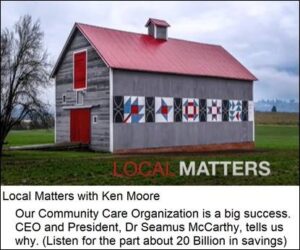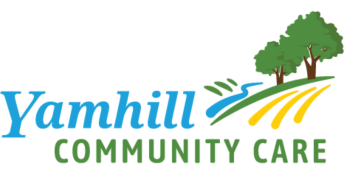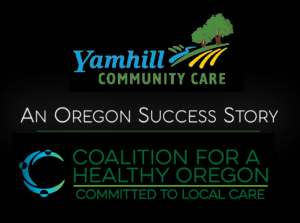
About Us
Yamhill Community Care is a non-profit coordinated care organization dedicated to managing the healthcare for Medicaid members, covered under the Oregon Health Plan, in Yamhill County, as well as parts of Washington and Polk Counties. Our mission is to improve the quality of life of the communities we serve by coordinating effective care. Beyond healthcare, we also provide an Early Learning Hub, supporting families and children with essential resources and programs for early childhood development. Together, we’re building a unified healthy community that celebrates physical, mental, emotional, spiritual, and social well-being.
CCOs let you keep your health care local.
Want to learn more about Yamhill Community Care (YCCO)?
 Listen to YCCO CEO and President, Seamus McCarthy, talk about why our Community Care Organization works.
Listen to YCCO CEO and President, Seamus McCarthy, talk about why our Community Care Organization works.
YCCO and the Coalition for a Healthy Oregon (COHO) have partnered to share the success and future goals of CCO’s across the state.
Watch Yamhill Community Care, An Oregon Success Story, to learn more!
Our work in your community
We’re a non-profit organization. That means all profits go back to local health and wellness programs. Social support services and agencies receive our grants. We’ve funded food and housing, rides to appointments, help with childcare, and support for parents.
- YCCO is an insurance plan, but isn’t a typical big insurance company. YCCO coordinates the care for people who are on Oregon Health Plan (OHP), or Medicaid, in Yamhill County and parts of Polk and Washington Counties.
- YCCO is a 501(c)3 non-profit with a local staff. We work closely with local companies like Providence Plan Partners and First Transit to make sure members have access to the customer service they need.
- Coordinated Care Organizations are a model designed to provide better care to improve health and lower cost. They help medical providers communicate with one another and with the insurance plan (YCCO) to make sure patients get the best care possible.
- CCOs also focus on preventative care and are working to shift the culture from sick-care, where symptoms and illnesses are treated, to well-care, which catches risks before they become illnesses.
- CCOs are designed to help foster a partnership between medical providers and patients, in which patients receive team-based care where they are a member of their health care team.
Vision and Mission
Our vision
A unified healthy community that celebrates physical, mental, emotional, spiritual, and social well-being.
Our mission
Working together to improve the quality of life and health of the Communities we serve by coordinating effective care.
These 10 guiding principles keep our standards high
- Health Education
- Accountability
- Innovation
- Evidence-Based Clinical Care
- Transparency
- Shared Responsibility
- Member Empowerment
- Wellness Promotion
- Equity
- Stewardship
This is our story
From its beginning in 2012, Yamhill Community Care (YCCO) has been a community-based, grassroots organization. When the call for CCO applications went out, the community decided it didn’t want an outside agency coming in and making choices for those who actually live here. Instead, local health leaders came together and chose to form their own small CCO.
CCOs are designed to return control to the members, and YCCO has continued to remain true to that vision.
- YCCO is still led by the people in the community. Its governance and advisory boards are made up of a wide range of local sectors, including representation from area clinics and hospitals, local government, school districts, early childhood education and childcare, and Oregon Health Plan members.
- YCCO is also the only community care organization in the state to be awarded an Early Learning Hub by the Oregon Department of Education’s Early Learning Division. This means that not only are physical health, mental health, dental health, and specialty care aligned, but services for young children and families are becoming integrated as well.
- YCCO works with other agencies in the area to make sure its members have all the support they need, including social support, care coordination, transportation, and access to affordable nutritious food.
YCCO is committed to equitable care
We are committed, every day, to offering equitable care for members. This means understanding who is receiving care and who isn’t, where the service gaps are in our community, and how members’ specific health needs can be met in the best way for them. It also includes offering a range of supports, like language interpretation, accessibility measures, and working with clinics and hospitals to improve their ability to serve all kinds of patients.
YCCO has committed to the following:
- Fostering staff and committee understanding of equity’s value, meaning, and impact in their everyday work and offering regular training, education, and support to elevate diverse voices.
- Gathering and analyzing available information about the people it serves, using demographics and disparities to inform decision-making and resource allocation.
- Regular review of policies, procedures, and practices using an Equity and Trauma-Informed Policy Audit Tool (Equity and TIC Audit Tool) resulting in continuous, intentional improvement.
- Enhancing outreach and engagement efforts through the Community Advisory Council, member feedback, and community listening sessions to ensure all perspectives are valued.
YCCO has adopted OHA’s Health Equity Committee 2019 definition of Health Equity:
“Oregon will have established a health system that creates health equity when all people can reach their full health potential and well-being and are not disadvantaged by their race, ethnicity, language, disability, gender, gender identity, sexual orientation, social class, intersections among these communities or identities, or other socially determined circumstances.
Achieving health equity requires the ongoing collaboration of all regions and sectors of the state, including tribal governments to address:
- The equitable distribution or redistribution of resources and power; and
- Recognizing, reconciling, and rectifying historical and contemporary injustices.”
How are we meeting you where you’re at?
Yamhill Community Care is your health plan. That means the decisions we make, the places we share our money, and the projects we do rely on your input. This community is our community; our staff and committees have families and friends here. We want this to be a safe, healthy place to live, work, and play.
We also know that for some people, getting or staying well is hard, for a whole lot of reasons.
- Living in a smaller town offers a lot of benefits, but it is harder to get “into town” for the things you need. Doctor appointments might require two bus rides and a day off work.
- For others, not having a fixed address means it’s harder to sign up for help.
- Some people have had bad events happen in their families or in their past that make going to DHS or finding a therapist scary.
- The color of someone’s skin can sometimes mean they get treated differently, or their needs get ignored.
- For some, speaking a language other than English means it’s hard to find services in that language.
- Finding safe and comfortable ways to get exercise can be tricky if there isn’t an easy path for wheelchairs or a safe park to play.
- We also know that being on OHP sometimes means people feel they are treated differently, just because of the insurance they have.
If you feel like you’re not being listened to, not getting the services you need, being treated differently, or simply need some extra support in your care, let us know! We need your help to improve.
Here are some ways to get in touch:
Call Customer Service: 1-855-722-8205 TTY/TDD: 1-800-735-2900
Email us: info@yamhillcco.org
Join the Community Advisory Council: Email info@yamhillcco.org for more info
Finally, here are some things we do:
– We make sure our staff and the people who make decisions are trained in things like language access, trauma, fair treatment, and equity.
– We use data to understand who our members are, what they need, and where needs aren’t being met.
– We review our plans and rules to keep the member in mind.
– We look at our staff and committees to see if they represent all the kinds of people in the community.
– We listen! Reach out and get feedback from members, the community, and our local partners.
We are committed to learning, listening, and changing when needed. We know we can always do better. No matter what role someone has at YCCO, they are working toward our mission of whole-person wellness for the entire community.


